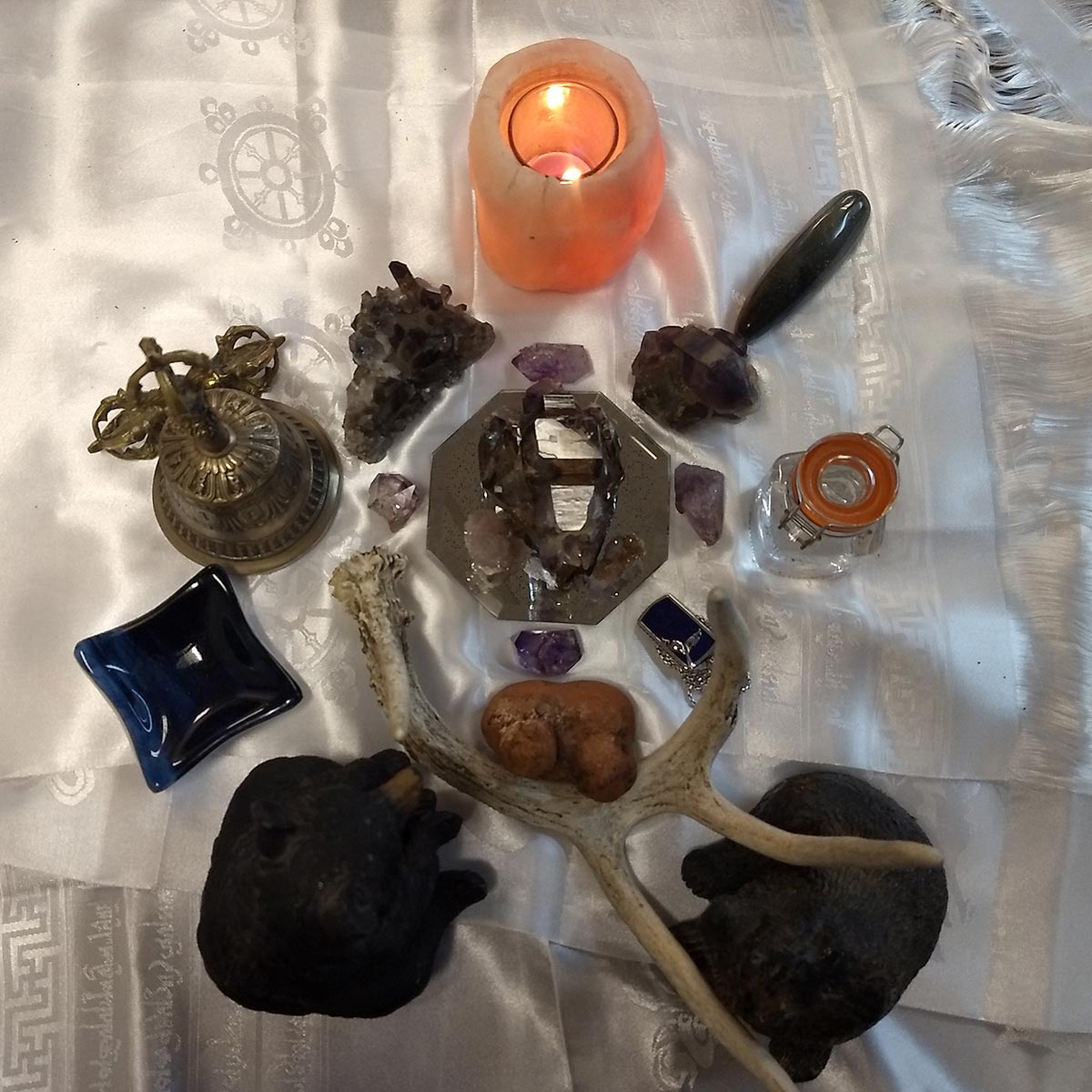As we journey through life, we often encounter challenges that test not just our physical strength, but our emotional and spiritual resilience as well. In these trying times, we may find ourselves seeking alternative paths to healing and personal growth. One such path, often overlooked, is rooted in our ancestral traditions – shamanism.
Contents
Shamanic Wellbeing
Shamanism is an ancient practice that has been used for centuries by indigenous cultures around the world. It offers a rich and powerful foundation for healing, coaching, and spiritual counseling. The first time I stepped into the world of shamanism, it felt like coming home. It was as if I had stumbled upon a well-hidden treasure, a beacon of hope that promised healing and transformation. With each passing day, my belief in the transformative power of shamanism has only grown stronger.
Shamanism teaches us that everything is alive and interconnected. It helps us reconnect with our true selves, with nature, and with the divine spirit. In doing so, it provides a path to healing that is holistic and deeply empowering.
- Healing: Shamanic healing works on the principle that our physical wellbeing is intrinsically tied to our emotional, mental, and spiritual health. It uses a variety of tools and techniques, including energy healing, soul retrieval, and journeying to treat a host of physical and emotional ailments.
- Coaching: Shamanic coaching, on the other hand, taps into the wisdom of our ancestors and spirit guides to help us navigate life’s challenges. It aims to build resilience, foster self-awareness, and inspire personal growth.
- Spiritual Counseling: Finally, shamanic spiritual counseling seeks to nurture our spiritual health, helping us connect with our higher selves and find purpose and meaning in life.
By integrating shamanism into these aspects of personal development and wellbeing, we can create a powerful synergy that brings about profound and lasting change.
The Power of Shamanic Healing
As a seasoned practitioner, I strongly believe in the transformative potential of shamanic healing. This age-old practice, deeply rooted in indigenous cultures across the globe, offers profound benefits for those seeking holistic healing and personal growth. Unlike conventional medicine, which often focuses solely on physical symptoms, shamanic healing encompasses the entirety of our being – mind, body, and spirit.
In this regard, it’s pertinent to discuss the key benefits of incorporating shamanic healing with personal coaching for a client’s well-being. The advantages are multi-dimensional and may vary from person to person, reflecting the highly individual nature of the healing journey.
- Emotional Healing: Shamanic healing practices such as soul retrieval can assist in healing emotional wounds, often traced to past traumas. This process can lead to profound transformations, allowing clients to release old patterns and embrace new perspectives.
- Physical Healing: Shamanic healing methods like energy medicine promote physical health by addressing imbalances in the body’s energy field. They can aid in reducing physical pain, enhancing vitality, and supporting the body’s natural healing abilities.
- Spiritual Growth: Shamanic journeys facilitate direct communication with spirit guides, fostering a deep sense of interconnectedness and spiritual growth. This connection can provide guidance and clarity for those on the path of self-discovery.
Working With a Practitioner
Working with a shamanic practitioner can yield additional benefits, particularly when combined with coaching techniques. Here, the shaman acts as a guide, facilitating the individual’s journey towards self-awareness and empowerment. This synergistic approach allows for deep, sustained changes, as the client harnesses their inner wisdom and healing capabilities.
“The shamanic path is a journey towards wholeness – a journey that acknowledges the interconnectedness of all life and seeks to bring about balance and harmony within the individual and the world.”
~Anonymous
As we delve deeper into the realm of shamanic practices, it’s worth acknowledging that this path is not for everyone. It requires an openness to explore unseen realms and to confront one’s shadows. But for those who are ready, the rewards can be profound and life-changing. I invite you to consider the potential benefits of this holistic approach to healing and personal development.
The blend of shamanic healing and personal coaching is a powerful tool for those seeking a deeper understanding of themselves and their place in the world. It offers a pathway to healing that acknowledges the whole person and fosters a deep sense of connection and purpose.
Understanding Shamanism
In our journey to explore the edges of well-being and personal development, we inevitably come across the term shamanism. As a practitioner myself, I find shamanism to be an integral and often misunderstood component of holistic healing and coaching. Shamanism, in its essence, is an ancient spiritual practice rooted in indigenous societies around the world (from the Siberian Tungus tribe to the South American cultures). It serves as an intersection between spirituality, healing, and nature. Shamanism is grounded in the belief that everything has a spirit and that we, as humans, are interconnected with all elements of the universe.
Shamanism is not a religion, but rather a spiritual practice or methodology that enhances our connection to the natural world and the spirit realm. It allows us to tap into the wisdom of our ancestors and the natural world, facilitating deep healing and transformation on a personal and collective level. The shamanic journey, a key practice in shamanism, involves entering a trance state through rhythmic drumming or other methods to connect with spirit guides and gain wisdom or healing.
What is Shamanism?
Shamanism is the path of direct revelation. It opens the door to a world where we can interact with compassionate helping spirits and cultivate a relationship with all life.
Incorporating shamanism into a healing or coaching practice can greatly amplify the benefits for clients, offering several distinct advantages:
- Deep Personal Healing: Shamanic methods can allow individuals to delve into the deepest layers of their psyche, unearthing and healing traumas that traditional therapies may not fully reach.
- Empowerment: Shamanism places a strong emphasis on personal power and responsibility. It teaches that we are the creators of our own reality, empowering individuals to take control of their lives and their healing journey.
- Spiritual Connection: Shamanic practices foster a deeper connection to the spiritual realm, opening the door to guidance from spirit allies and higher consciousness.
- Balanced Living: By recognizing the interconnection of all life, shamanism encourages a balanced lifestyle that respects and nurtures the earth and all its inhabitants.
It is important to note that while shamanic practice can be immensely beneficial, it is not a replacement for conventional medical or psychological treatment. Instead, it functions as a complementary approach, enhancing and amplifying the effects of other forms of therapy and coaching. As a shamanic practitioner, I firmly believe in the value and potency of this ancient practice, and I invite you to explore how it might enrich your own journey towards well-being.
The Benefits of Working with a Shamanic Practitioner
As someone who has observed the transformative power of shamanic healing and coaching, I am drawn to share my insights on the manifold benefits of including this ancient wisdom into your personal journey. Shamanism is not a religion, but a spiritual practice rooted in the belief that all life is interconnected, a philosophy that has been upheld by indigenous cultures worldwide. Engaging with a shamanic practitioner can offer profound benefits for your physical, emotional, and spiritual well-being.
1. Holistic Healing and Wellness
Shamanic healing addresses the whole person (body, mind, and spirit), not just the physical symptoms of an illness. This holistic approach recognizes that well-being is deeply interconnected with our emotional and spiritual health. A shamanic practitioner facilitates healing by helping the individual to restore their energy balance, often resulting in improved physical health and emotional stability.
2. Connection with Self and the Universe
Shamanic practices foster a deep connection with the self and the universe. In our modern, technology-driven lives, we often feel disconnected from nature and our own spiritual essence. Shamanic healing can re-awaken that profound connection, fostering a sense of belonging and unity with all life.
3. Emotional Release and Trauma Healing
Shamanic healing can provide a safe space for the release of deeply held emotions and traumas. Shamanic practitioners use techniques such as journeying, soul retrieval, and ancestral healing to guide individuals through their healing process. This emotional cleansing can lead to profound personal transformation and growth.
4. Empowerment and Personal Growth
Engaging with shamanic practices empowers individuals by awakening their innate healing capabilities. Shamanic coaching can facilitate personal growth by fostering self-awareness, resilience, and the capacity to navigate life’s challenges with grace and wisdom.
Working with a shamanic practitioner offers an enriching pathway to self-discovery, healing, connection, and empowerment. It’s an invitation to deepen your understanding of yourself and the world around you, to heal old wounds, and to step into your power. For those considering this journey, I encourage you to approach it with an open heart and mind, ready to embrace the transformation that awaits.
Shamanic Healing and Coaching: A Dynamic Duo
As we delve into the world of Shamanic healing and coaching, it’s crucial to understand the unique synergy they present. Shamanic healing, an ancient spiritual method rooted in indigenous cultures, provides profound insights into the nature of existence and our relationship with the cosmos. Coaching, on the other hand, can be viewed as a more contemporary and practical approach to fostering personal growth and development. When these two approaches are combined, they offer a dynamic duo that can significantly enhance a client’s overall well-being.
Shamanic healing (which taps into the spiritual world for guidance and healing) brings a depth of wisdom and understanding that can profoundly transform one’s life. It fosters a deep connection to nature, spiritual entities, and the self, which can lead to profound personal transformations. It’s like being given a roadmap to your soul, where you can confront your fears, heal past wounds, and gain a better understanding of your life’s purpose.
Then There is Coaching
This modern method of assisting individuals in achieving their goals works by helping clients identify their strengths and weaknesses, set realistic goals, and develop strategies to achieve them. Coaching, with its focus on the ‘here and now’, complements the broader perspective of Shamanic healing.
Now, imagine the power of combining these two approaches. It’s like merging a spiritual compass (Shamanic healing) with a practical roadmap (coaching). The resulting synergy provides the client with a holistic approach to healing and personal development that is both profound and applicable in daily life.
The following are some of the key benefits of combining Shamanic healing and coaching:
- Spiritual Awareness: Shamanic healing opens up a new realm of spiritual understanding. This awareness, when used in conjunction with coaching, can provide a deeper sense of purpose and direction.
- Sustained Personal Growth: The practical strategies offered by coaching, bolstered by the spiritual insights from Shamanic healing, can lead to sustained personal growth and development.
- Emotional Healing: Shamanic healing can address deep-seated emotional issues, and coaching can provide the necessary tools to manage these emotions effectively.
- Improved Self-Confidence: As individuals gain a better understanding of themselves (through Shamanic healing) and develop practical skills (through coaching), they often experience improved self-confidence and self-esteem.
The combination of Shamanic healing and coaching offers a multifaceted approach to personal development and healing. It provides clients with the spiritual insights of Shamanic healing and the practical strategies of coaching, leading to a well-rounded and comprehensive path to personal growth. For those considering working with a shamanic practitioner, the benefits are not only profound but also practical and applicable in daily life.
Spirituality and Shamanism: Finding Inner Peace
As we explore the realm of spirituality, we often find ourselves drawn towards practices and traditions that have stood the test of time, offering wisdom and healing modalities that modern medicine sometimes fails to provide. Shamanism, a spiritual practice that predates all organized religions, is one such tradition that holds immense potential for those seeking inner peace, healing, and personal growth.
Shamanism, at its core, involves a practitioner reaching altered states of consciousness in order to perceive and interact with the spirit world and channel these transcendental energies into this world. The practitioner, also known as a shaman, serves as a bridge between the physical and spiritual realms, providing guidance, healing, and transformation for those who seek it.
The Advantages of Shamanism
The integration of shamanic practices into a healing or coaching regimen can offer a plethora of advantages.
Firstly(i) Empowerment: A shamanic practitioner empowers an individual to take control of their own healing process. Through shamanic journeying, individuals get to understand and experience first-hand the unseen realms, thereby gaining insights that can help them overcome their challenges.
Secondly(ii) Holistic Healing: Shamanic healing is not just about addressing a particular symptom or ailment. It focuses on the entire person – body, mind, and spirit – acknowledging that all aspects of our being are interconnected and need to be in balance for optimal health.
Thirdly(iii) Enhanced Intuition: Shamanic practices often involve journeying to the spirit world, which can help individuals to become more attuned to their intuition. This enhanced intuition can guide individuals in making decisions that are in alignment with their highest good.
Fourthly(iv) Personal Growth and Transformation: Shamanic healing and coaching can serve as catalysts for personal growth and transformation. As individuals delve deeper into their spiritual journeys, they often uncover layers of their being that were previously hidden, leading to a deeper understanding of themselves and their place in the world.
Lastly(v) Connection with Nature: Shamanism is deeply rooted in the reverence for nature and all its elements. This connection with nature can promote a sense of peace and grounding, helping individuals to navigate their lives with more grace and ease.
Shamanism doesn’t just aim to heal your body; it aims to heal your soul, and in doing so, it transforms your life.
For someone considering working with a shamanic practitioner, it is critical to approach the process with an open heart and mind, ready to embrace the wisdom and healing that shamanism can offer. Remember, the journey is as important as the destination, and the wisdom you gain along the way can transform not just your health, but your very life.
Connecting with Nature: The Foundation of Shamanism
As I delve into the heart of shamanism, it becomes evident that its foundation lies in the profound bond between humans and nature. This unique relationship serves as the cornerstone for shamanic practices, and it is through this connection that the potential for healing, coaching, and spiritual growth is unlocked.
Shamanism, at its core, is a practice rooted in the belief that everything in the universe is interconnected. From the towering mountains to the smallest insects, from the celestial bodies in the cosmos to the microorganisms that inhabit our bodies—everything is considered to hold a vital life force or spirit. It’s an inclusive worldview that embraces all forms and aspects of life, breaking down the barriers of separation and hierarchy often imposed by mainstream cultures.
It is crucial to understand that this connection with nature goes beyond mere appreciation or enjoyment of the natural world. Rather, it is about genuinely recognizing and respecting the inherent worth and wisdom of all living beings and elements of nature. It is about cultivating a deep sense of kinship with the world around us, seeing ourselves as part of a greater whole rather than as separate entities.
By helping individuals strengthen their connection with nature, shamanic practitioners can facilitate a profound shift in consciousness. This shift can lead to increased self-awareness and a greater understanding of one’s place and purpose in the world, which are essential components of personal growth and healing.
Shamanism opens up a doorway to a dimension of reality where the material world meets the spiritual. It allows us to commune with the natural world in a way that promotes healing, wholeness, and harmony.
If you’re interested in Mother Earth as a spiritual being, consider reading “Who and What is Mother Earth.”
The Role of Ancestors in Shamanic Healing
In the intricate tapestry of shamanic healing, the role of ancestors stands paramount. They are not just figures from the past, but vital guiding forces that support us, teach us, and influence our lives in profound ways. Their wisdom and experiences, held within the collective ancestral memory (a concept deeply intertwined with shamanic belief), can assist us significantly in our journey towards healing and self-discovery.
Working with a shamanic practitioner, you will often find that the ancestors are called upon during the healing process. This is done through a variety of methods, including ancestor reverence rituals, spiritual journeying, and divination techniques. By connecting with the ancestors, the practitioner is able to tap into a deep well of knowledge, wisdom, and spiritual guidance.
Ancestors, in the broadest sense, represent the collective wisdom of our lineage. Through their experiences, struggles, and triumphs, they have amassed a wealth of knowledge and understanding. It is this wisdom that we access during shamanic healing, providing insight and clarity as we navigate our own life’s journey.
Ancestral Wisdom
By incorporating ancestral wisdom into the healing process, several advantages become evident:
- Healing Past Trauma: Ancestors can provide insights into past traumas and patterns that may be influencing our current life. By understanding and addressing these issues, we initiate a healing process that can impact not just us, but our entire lineage.
- Guidance and Wisdom: The experiences and lessons learned by our ancestors can act as a guide, providing us with wisdom and understanding as we navigate our personal and spiritual growth. This guidance can be invaluable during times of uncertainty or challenge.
- Connection and Belonging: Connecting with our ancestors can help foster a sense of belonging and rootedness. This connection can provide comfort, stability, and a deeper understanding of our place in the world.
It’s important to note that the relationship with our ancestors is not one-sided. As we heal and grow, we also contribute to the healing of our ancestors and the broader ancestral lineage. This reciprocal relationship underscores the interconnectedness that is a core tenet of shamanic belief.
Including ancestors in the shamanic healing process offers a multi-dimensional approach to healing and personal development. It invites profound wisdom, offers deeper understanding of our personal histories, and fosters a strong connection with our roots. For anyone considering working with a shamanic practitioner, acknowledging and embracing the role of ancestors can significantly enhance the healing journey.
Healing Trauma with Shamanic Techniques
As we delve into the realm of healing trauma with Shamanic techniques, it is essential to understand the profound impact these ancient practices can have on an individual’s psychological, emotional, and spiritual well-being. As most of us are aware, trauma can leave deep-rooted scars that modern therapeutic modalities may sometimes fail to address completely. This is where Shamanic healing techniques demonstrate their value, providing a complementary, often deeply transformative approach to trauma recovery.
Shamanic healing operates on the belief that trauma causes a part of our spirit to disconnect, leading to a condition known as ‘soul loss’. This disconnected part, often harboring the traumatic experience, can cause a multitude of emotional and psychological issues if not addressed. Shamanic practitioners facilitate what is known as a ‘soul retrieval’ process wherein they journey into the non-ordinary reality to retrieve these lost soul parts and reintegrate them into the client, fostering wholeness and healing.
The Benefits of Shamanic Methods
The benefits of integrating Shamanic methods into trauma healing are multi-dimensional:
- Deep Healing: Shamanic healing works on deep levels, often reaching areas that conventional therapeutic practices may not. It addresses not just the symptoms of trauma but also its root cause, facilitating a comprehensive healing process.
- Spiritual Connection: Shamanic practices inherently involve a connection with the spirit world. This connection can provide a sense of comfort, guidance, and purpose, all of which can be instrumental in trauma recovery.
- Empowerment: As shamanic healing is a participatory process, it empowers clients by involving them actively in their healing journey. This engagement can lead to a sense of control and self-efficacy, essential components of trauma recovery.
- Community Support: Shamanism emphasizes community support and collective healing, providing a supportive network for individuals navigating their trauma recovery.
However, it must be noted that Shamanic healing requires a willing participant and an experienced practitioner. It is a potent tool in the hands of a skilled Shaman but can be misused by those lacking genuine knowledge and understanding of the tradition. Hence, if considering Shamanic healing for trauma, it is crucial to seek a reputable and experienced Shamanic practitioner.
Shamanic healing is not a ‘quick fix’ but a journey towards wholeness, self-discovery, and empowerment. It is an invitation to step into your own power, heal past traumas, and create a life filled with joy, peace, and purpose.
Integrating Shamanic healing techniques into trauma therapy can provide a holistic, participatory, and deeply transformative approach to healing. It invites the participant to take an active role in their journey, fostering self-efficacy, resilience, and a profound spiritual connection. However, as with any therapeutic modality, it is essential that this journey is embarked upon with the guidance of an experienced practitioner.
It’s also important to understand that Shamanism may or may not include the use of entheogens. To understand this more fully, I suggest reading, “Shamanism: The Awakening of the Mind.”
If you’d like to explore Shamanic Healing and/or Coaching, please set up a Consultation With Me.











